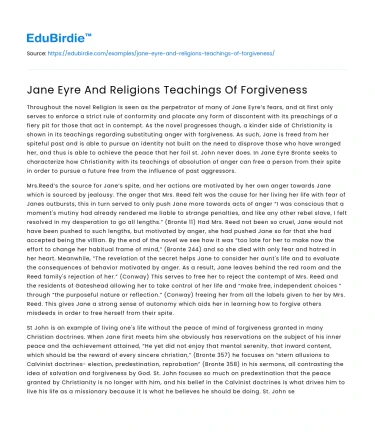Throughout the novel Religion is seen as the perpetrator of many of Jane Eyre’s fears, and at first only serves to enforce a strict rule of conformity and placate any form of discontent with its preachings of a fiery pit for those that act in contempt. As the novel progresses though, a kinder side of Christianity is shown in its teachings regarding substituting anger with forgiveness. As such, Jane is freed from her spiteful past and is able to pursue an identity not built on the need to disprove those who have wronged her, and thus is able to achieve the peace that her foil st. John never does. In Jane Eyre Bronte seeks to characterize how Christianity with its teachings of absolution of anger can free a person from their spite in order to pursue a future free from the influence of past aggressors.
Mrs.Reed’s the source for Jane’s spite, and her actions are motivated by her own anger towards Jane which is sourced by jealousy. The anger that Mrs. Reed felt was the cause for her living her life with fear of Janes outbursts, this in turn served to only push Jane more towards acts of anger “I was conscious that a moment's mutiny had already rendered me liable to strange penalties, and like any other rebel slave, I felt resolved in my desperation to go all lengths.” (Bronte 11) Had Mrs. Reed not been so cruel, Jane would not have been pushed to such lengths, but motivated by anger, she had pushed Jane so far that she had accepted being the villian. By the end of the novel we see how it was “too late for her to make now the effort to change her habitual frame of mind,” (Bronte 244) and so she died with only fear and hatred in her heart. Meanwhile, “The revelation of the secret helps Jane to consider her aunt's life and to evaluate the consequences of behavior motivated by anger. As a result, Jane leaves behind the red room and the Reed family's rejection of her.” (Conway) This serves to free her to reject the contempt of Mrs. Reed and the residents of Gateshead allowing her to take control of her life and “make free, independent choices “ through “the purposeful nature or reflection.” (Conway) freeing her from all the labels given to her by Mrs. Reed. This gives Jane a strong sense of autonomy which aids her in learning how to forgive others misdeeds in order to free herself from their spite.
Save your time!
We can take care of your essay
- Proper editing and formatting
- Free revision, title page, and bibliography
- Flexible prices and money-back guarantee
St John is an example of living one's life without the peace of mind of forgiveness granted in many Christian doctrines. When Jane first meets him she obviously has reservations on the subject of his inner peace and the achievement attained, “He yet did not enjoy that mental serenity, that inward content, which should be the reward of every sincere christian,” (Bronte 357) he focuses on “stern allusions to Calvinist doctrines- election, predestination, reprobation” (Bronte 358) in his sermons, all contrasting the idea of salvation and forgiveness by God. St. John focuses so much on predestination that the peace granted by Christianity is no longer with him, and his belief in the Calvinist doctrines is what drives him to live his life as a missionary because it is what he believes he should be doing. St. John serves as a caution in regards to going against oneself and pushing themselves beyond what they are capable of in order to do what others had predetermined, and as such rejecting all forms of what defines their identity in order to satisfy another person's or entity's idea of what somebody should do with their future.
In contrast, Jane is able to reflect helping her “grow and to reject self pity or continued resentment.” (Conway) and “By discerning for herself what she perceives to be God's will, Jane effectively resists Rochester's and St. John's attempts to possess her spirit as well as her body,” (Lamonica) allowing her to focus on herself and make decisions as an autonomous individual not driven by outside influences.
Forgiveness and divine intervention plays a major role in Jane reconciling with Rochester. It is only the anger towards his past that leaves Rochester with such guilt and as such he lives life limited by the fear of God punishing him for his rejection of the marital arrangements imposed on him by his family. He believes that he can repent with servicing Jane as a husband because he hasn't been able to serve anyone else, hoping to get it right with Jane. And it is clear that a divine entity has forgiven him because when he cries out “I asked of god, if I had not been long enough desolate, afflicted, tormented- I could scarcely endure more, I pleaded ‘Jane! Jane! Jane!’,” (Bronte 455) He is answered by a divine entity sending his anguished lamenting to Jane so that she may return and thus forgive him showing he has gained the confidence of God once more. Ultimately it is Jane's own love for Rochester that leads her back, she had the ability to decide whether she forgives him or not and because she had learned to reign in her passion in order to “subordinate the bad self to the good self, passion and impulse to reason and conscience.” (Kramer)






 Stuck on your essay?
Stuck on your essay?

